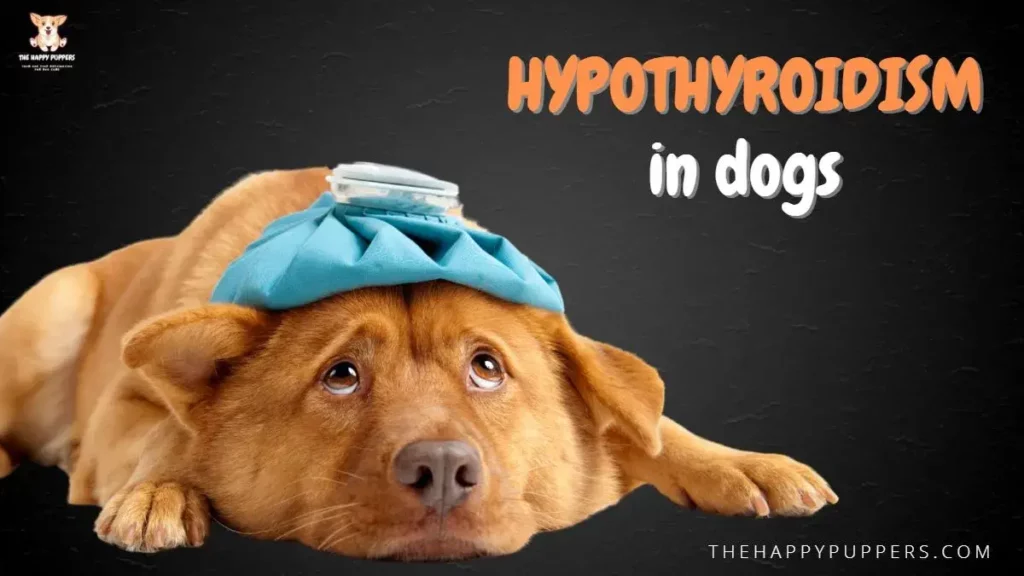Hyperthyroidism is a condition that can not only affect us but also our beloved dogs. It is a common disease in dogs. It can affect most dogs and the symptoms can go unnoticed for a long time.
Topics covered in this blog post
What is hypothyroidism?
Both in the case of dogs and humans, the thyroid gland is located in the neck region. It is found near the windpipe or trachea and is made up of two lobes present on either side of the trachea.
The functions of the thyroid gland is monitored by the pituitary gland. It is mainly responsible for the production of a hormone known as thyroxine which is responsible for regulating the metabolism.
If a person or dog is suffering from hypothyroidism, ,the thyroid gland does not produce enough of the thyroxine hormone.
What breed of dogs are affected by this?
Hyperthyroidism can affect almost all breeds of dogs. However, this disease is more commonly observed in certain breeds like Cocker Spaniel, Irish Setters, Borers, Doberman Pinschers and Dachshunds. This disease mostly occurs in dogs ranging from 4 to 10 years in age.
Spayed females and neutered males have been observed to be at a higher risk of getting affected than their non-neutered and non-spayed counterparts.
Why does hypothyroidism occur?
There can be multiple reasons behind hypothyroidism:
- Your dog is suffering from an autoimmune disease known as idiopathic thyroid gland atrophy or lymphocytic thyroiditis. In case of lymphocytic thyroditis, which is an immune mediated disease, the immune cells recognize the cells of the thyroid gland as foreign and attack them, thus destroying the thyroid gland and hampering the production of thyroxine. The cause behind this is not known yet.
In case of the idiopathic thyroid gland atrophy, the normal cells of the thyroid undergoes replacement by adipose (fat) cells.
- Your dog has a tumour in the thyroid gland (5% of cases).
- Shrinkage of the thyroid gland.
Whatever be the cause behind hyperthyroidism, the diagnosis and treatment are the same in all cases.
SYMPTOMS of hypothyroidism in dogs:
The following symptoms indicate that your dog might be suffering from hypothyroidism:
- Hair loss in the following regions
- trunk/snoot
- tail
- back of rear legs
- Dull and thin coat
- Flaky skin (non red or itchy)
- Black patches of skin
- Weight-gain
- Muscle loss
- Slowed heart rate
- Infections of the ear and toenails
- Overall lethargic behavior
- Low cold tolerance
- High levels of blood cholesterol
- Substances called as mucopolysaccharides may get accumulated in the face, giving the face a droopy kind of look, thus giving the dog a facial expression which makes him/her look ‘grumpy.’
Some dogs also exhibit other abnormalities along with hypothyroidism like:
- Seizures
- Infusibility
- Problems of heart and blood vessels
- Dilatation of the esophagus which leads to regurgitation
- Abnormal muscle function causing weakness and difficulty in walking
- Libido loss and infertility (in case of intact males)
- Absence of heat periods, abortion and infertility in females
- Deposition of fat in the cornea
- Dry eye or keratoconjunctivitis due to absence of proper tear production.
How is hypothyroidism diagnosed ?
Hypothyroidism can be diagnosed by a simple blood test. There are several kinds of blood tests available for the diagnosis of hypothyroidism in dogs.
The most commonly used screening test is the TOTAL THYROXIN LEVEL (TT4). This blood test measures the quantity of the total thyroxine hormone in the blood. A final definitive diagnosis is made via conducting a complete thyroid panel assessment or testing for the level of free T4 by the process of equilibrium dialysis. Some dogs may show presence of low TT4 and normal free levels of T4 via equilibrium dialysis. These dogs are not suffering from hypothyroidism. Presence of the clinical signs of hyperthyroidism along with a low level of total thyroxine is indicative of hypothyroidism.
Following this, a definitive diagnosis is made via another blood sample testing in which multiple forms of thyroxine are assessed like total T4, free T4, endogenous TSH etc.
Blood testing is mostly performed as a series of tests. Some of these tests can be affected by presence of non-thyroid diseases too, thus the diagnosis is made in the light of the whole picture.
Treatment of hypothyroidism:
Hypothyroidism is not a life threatening condition in dogs. It is fairly easy to treat and the drug is inexpensive.
To keep the thyroxine levels normal, your dog will be administered the hormone thyroxine twice orally for the rest of his life on a daily basis. Once the fur coat starts to show signs of improvement, the hormone administration might be reduced to once a day.
T3
T4
T4 is converted into the T3 form by the body. Most dogs suffering from hypothyroidism will be administered T4 as their body can convert it into the usable form, T3. In some cases, where the dog is unable to convert T4 into T3, T3 medication is administered. The exact dose of T3/T4 to be administered is determined by the results of the blood test.
It will usually take about 4 to 6 weeks before the growth of the fur becomes obvious to the eye. In case your dog is also suffering from an ear infection, the ear canal must be first cleaned and then treated with antibiotic drop put in the ear or oral antibiotics administered by the mouth.
Prevention:
Unfortunately, there are no specific preventive measures which can be assured to reduce the risk of your dog developing hypothyroidism. However, proper diet, nutrition, exercise and administration of supplements will boost your dog’s immune system and keep him or her healthy in the long run.
Conclusion:
Luckily this disease is not life threatening. Proper as well as regular medication can keep your dog healthy and allow him or her to lead a long life. All you as a dog guardian must do is keep a check on your dog’s weight, make sure he or she gets proper and regular exercise. In case you notice something out of the ordinary, do not delay in consulting your vet.
That’s all for now folks..!!
PS: If you like this article, please subscribe so that I can send you all the latest dog care tips and insights directly into your inbox.
Thank you



15 Comments
This is so good to know! I had never thought about the fact that dogs could have hypothyroidism but it's great to know what to look out for.
I've known a couple of dogs that suffered from this and it's heartbreaking to see! It took a while to diagnose as well. They're ok now but when we didn't know what was wrong, it was hard to see them like this! It's important for people to beon the lookout of this sort of thing so thank you for sharing!
Hypothyroidism is a classical disease in dogs as well as people. In a few rare cases, hypothyroidism can interfere with heart function. This can be more dangerous as it paves the way for heart failure or a heart attack.
I don't have a dog but I've learned that if I take one there are many things that are taken for granted and so it's not about their health.
I had no idea that dogs could have this problem too. I am incredibly happy to know what to do if I suspect something weird in our pups. Thank you for the information.
We recently had our furbaby and this information is very vital for me raising him. Thank you for this!
i never realized that a dog could have hypothyroidism! i have a 6 month old puppy and i do want to be aware of any conditions that can affect his health
Thanks for sharing much valuable information…i haven't heard before about this disease..Indeed this blog post is much informative and helpful …Great work… ( World in Eyes)
This is good to know! There are so many conditions that we don't consider when it comes to our pets when, in fact, they can have just the same illnesses as humans.
My parents dog had this issue! It's crazy to think it is common.
I wasnt aware of any of this!! have never had a dog as a pet.
This is such a well researched post filled with tons of important information on a topic which many pet owners are not even aware! I will refer your blog to my pet owner friends. Thanks for writing this.
Very informative blog for people who can't figure out what their pets are going through. I t will help a lot.
I have been exploring for a little bit for any high quality articles or blog posts on this sort of area . Exploring in Yahoo I at last stumbled upon this website. Reading this information So i’m happy to convey that I’ve a very good uncanny feeling I discovered exactly what I needed. I most certainly will make certain to don’t forget this website and give it a look regularly.
Your point of view caught my eye and was very interesting. Thanks. I have a question for you.